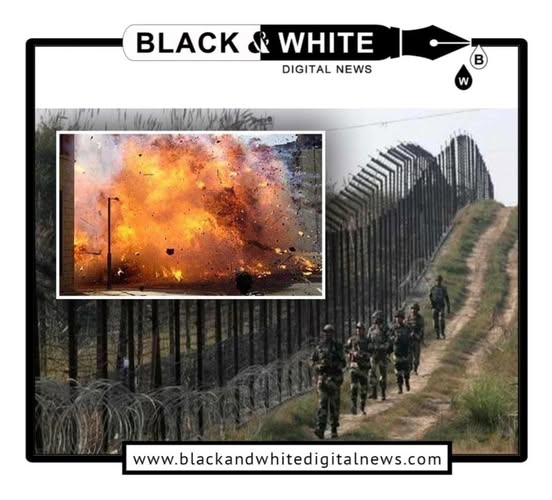Five Pakistani Terrorists Killed in Landmine Blast While Infiltrating LoC in Poonch
A Major Blow to Cross-Border Terrorism
||Black and White Digital News ||
||Parvinder Singh February 07,2025 ||
POONCH : In a significant development along the Line of Control (LoC), five Pakistani terrorists were killed in a landmine explosion while attempting to infiltrate into India’s Poonch sector. Official sources confirmed that the group was trying to cross over from the Battal sector when one of them accidentally stepped on a landmine, triggering a powerful blast. The explosion not only killed all five terrorists but also detonated an Improvised Explosive Device (IED) they were carrying, amplifying the impact.
This incident comes at a time when security forces are on high alert due to increased infiltration attempts from across the border. The deaths of these terrorists underscore the effectiveness of India’s counter-infiltration strategy and raise critical questions about Pakistan’s continued support for terrorism.
Detailed Analysis of the Incident:
• Location: Battal sector, Poonch, Jammu and Kashmir
• Time of Incident: Late night, under the cover of darkness
• Casualties: All five terrorists killed
• Cause: Landmine explosion, which also detonated an IED they were carrying
Security sources revealed that Indian forces had been monitoring increased movements along the LoC in recent weeks. The terrorists, possibly belonging to a Pakistan-based terror outfit, were attempting to infiltrate through a well-known but heavily mined route.
While the exact identities of the terrorists are yet to be confirmed, the fact that they were carrying an IED suggests they were on a mission to carry out an attack inside Indian territory. This raises serious security concerns and further strengthens India’s position on the role of Pakistan in fostering cross-border terrorism.
Strategic & Security Implications
Growing Infiltration Attempts from Pakistan:
Poonch and Rajouri sectors have become hotspots for infiltration attempts due to their dense forests and rugged terrain, which provide natural cover for terrorists. In the last few months, security forces have noticed an uptick in such attempts, indicating that terror groups are desperate to push operatives into India.
The Role of Landmines in India’s Defense Strategy:
India has long used landmines as part of its counter-infiltration measures along the LoC. These mines serve as a deterrent to terrorist movements, as seen in this case. The incident proves the effectiveness of such defensive tactics and justifies their continued deployment.
Pakistan’s Involvement: State-Sponsored Terrorism?
India has consistently accused Pakistan of providing logistical and operational support to terror groups like Jaish-e-Mohammed (JeM) and Lashkar-e-Taiba (LeT). The presence of IEDs with the infiltrators suggests that they had undergone prior training, possibly in Pakistan-occupied Kashmir (PoK) or terror camps in Pakistan.
While Pakistan has denied any involvement, this incident once again raises the question:
• How did these terrorists acquire military-grade explosives and training?
• Why do infiltration attempts increase whenever there is political or security pressure on Pakistan?
This aligns with previous trends where Pakistan has tried to escalate tensions in Kashmir whenever India makes diplomatic or military gains on the global stage.
India’s Counter-Terrorism Response
Strengthened Border Surveillance:
Indian security forces have significantly enhanced border surveillance using:
• Electronic sensors and thermal imaging cameras to detect movements in real time.
• Drones and UAVs for aerial reconnaissance over sensitive border regions.
• Increased night patrols by the Indian Army and Border Security Force (BSF).
Anti-Terror Operations in Kashmir:
Apart from tackling infiltrators at the border, Indian security forces have been conducting aggressive anti-terror operations in the Kashmir Valley. In recent months, several top commanders of Pakistan-backed terror groups have been neutralized.
Diplomatic Pressure on Pakistan:
India has continued to raise the issue of Pakistan-sponsored terrorism on international platforms. After incidents like this, New Delhi is likely to:
• Expose Pakistan’s role in global forums like the United Nations.
• Seek stricter financial restrictions on Pakistan-backed terror groups through Financial Action Task Force (FATF) regulations.
• Strengthen counter-terror cooperation with allies like the U.S., France, and Israel.
Reactions from Various Stakeholders
Government & Security Forces:
• The Indian Army has reiterated its commitment to ensuring that the LoC remains impenetrable to terrorist infiltrations.
• Defense experts have hailed this as a success of India’s robust border security measures.
Public & Local Sentiment:
While the incident reinforces confidence in the Army’s preparedness, local residents in border areas remain cautious. Past experiences show that terrorist groups often retaliate with attacks inside Jammu and Kashmir after such failed infiltration attempts.
Pakistan’s Response: As expected, Pakistan has not officially commented on the incident. However, its denial strategy follows a familiar pattern where it refuses to acknowledge terrorist casualties on its side of the LoC.
A Tactical Victory but a Continuing Threat:
The elimination of five terrorists attempting to infiltrate the LoC in Poonch is a significant win for Indian security forces. However, it also highlights the persistent threat of cross-border terrorism and the need for constant vigilance.
This incident should serve as a warning to Pakistan-backed terror outfits that India’s border defenses remain formidable. While this failed attempt has cost them five operatives, security experts believe that more such attempts will follow, requiring Indian forces to stay alert and proactive in their counter-terror efforts.




